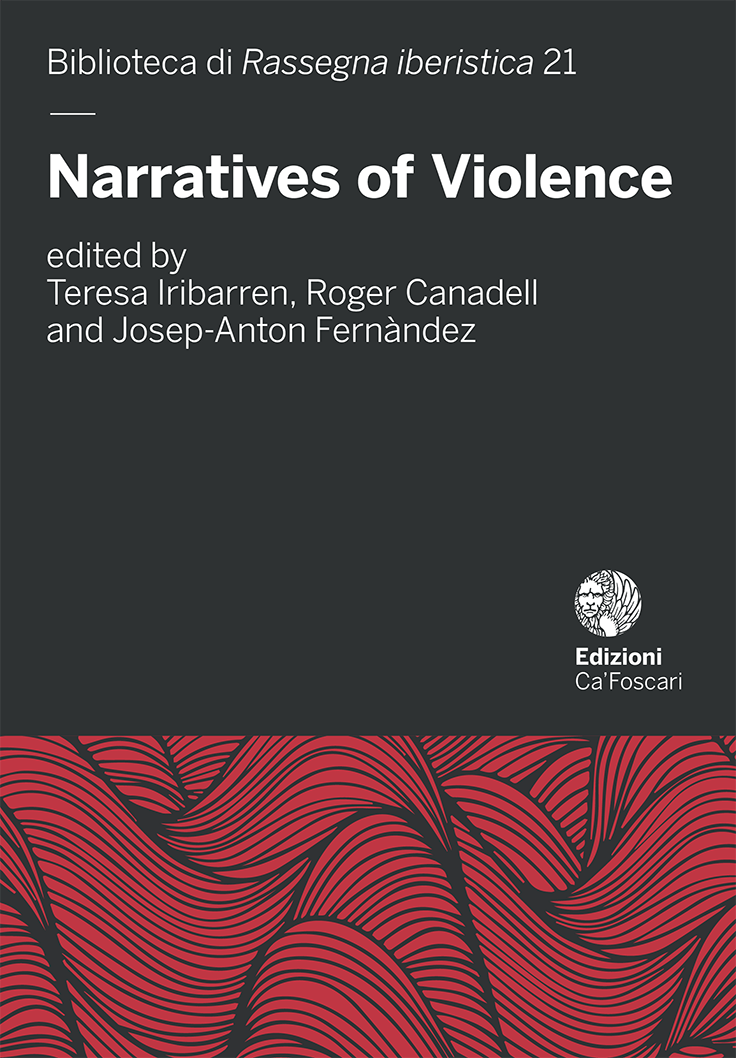
- search 2017 views
- file_download 756 download
- keyboard_capslockmetadata
-
mark_email_readIscriviti alla newsletter
Narratives of Violence
a cura di
abstract
Narratives of Violence is a contribution to the ethical turn in literary studies. In the current context of systemic political violence unleashed in the wake of 9/11 and the global advance of capitalism and neoliberalism, literature constitutes a particularly timely device to raise awareness about injustice, the abuse of power, and the violation of human rights. Literature may also be helpful in order to face social challenges such as peaceful coexistence with immigrants and displaced people, and the settling of refugees. This book is an invitation to read a selection of narratives of violence anchored in different geopolitical realities, and located in historical contexts ranging from the beginning of the 20th century to the present day. By adopting ethical criticism in order to tackle the dilemmas posed by these stories, we aim to contribute to the configuration of global imaginaries based on respect, recognition, and empathy, especially towards those who are most vulnerable. This collection offers critical readings of works of various genres, originally written in different languages. Authors discussed comprise Mrīrīda nʾait ʿAtiq (Morocco), Janina Hescheles (Poland), Eva Koch (Denmark), María Galindo (Bolivia) and Sonia Sánchez (Argentina), Najat El Hachmi (Morocco-Catalonia), Arundhati Roy (India), Leila Abdelrazaq (Palestine), and Yū Miri, Murata Sayaka, and Kawakami Mieko (Japan). The corpus includes biographical, autobiographical, testimonial, and fictional narratives, sometimes very close to documentary or life history. The works analysed in this collection portray experiences of violence and oppression caused by social, political, economic, and military conflicts. The novelty of this book lies in the challenge it poses to the Western-centric and patriarchal bias often found in similar collections of scholarly essays. Thus, the book focuses on female authors, seeking to give visibility and voice to women victims, generally forgotten in hegemonic cultural discourses.
-
Keywords keyboard_arrow_down
Marianne Hirsch • Morocco • Catalan literature • Dignity • Postcolonialism • Jay Winter • Walter Benjamin • Identity • Maurice Halbwachs • Anal sex • Eva Koch • Testimonial narrative • Polish Jewishness • Jean Laplanche • Body literature • Respect • Violence against women • Gender • Najat El Hachmi • Body • Holocaust • India • Interactive visual art • Representation • Systemic violence • Epistemic violence • Human rights • Subalternity • Violence • Colonialism • Historical memory • Immigration • Psychoanalysis • Youth • Nini Haslund Gleditsch • Kawakami Mieko • Mrīrīda nʾait ʿAtiq • Amazīgh culture • Symbolic violence • Testimony • Murata Sayaka • Yū Miri • Villar • Japanese literature • Economic violence • Heroism • Memory • Exile • Villar - Los hijos de Manuela • Precariousness • Memoir • Reading • Ethical turn • Feminism • Political violence • Ethics • Literature • Oliva and Norwegian humanitarian aid • Palestine • Prostitution • Temporality • Argentinean feminist movement • Graphic memoir • Genealogies • Sustainability • Spanish Civil War • Guerrillas
Sommario
- search 96 view
- file_download 20 download
- search 111 view
- file_download 12 download
- search 130 view
- file_download 14 download
- search 90 view
- file_download 10 download
- search 97 view
- file_download 13 download
- search 115 view
- file_download 20 download
- search 121 view
- file_download 27 download
- search 160 view
- file_download 28 download
- search 187 view
- file_download 41 download




